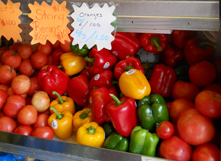Expanding TRF’s Food Access Program
TRF has made exciting strides in its efforts to promote equitable food access in local communities.
With assistance from the Bank of America Foundation, TRF hopes to share lessons from the successful Pennsylvania Fresh Food Financing Initiative nationwide. Established collaboratively in 2004 by the Commonwealth of Pennsylvania, The Food Trust, the Urban Affairs Coalition and TRF, FFFI provides financing for supermarkets committed to operating in underserved communities. In Pennsylvania, 88 projects to date have been approved for a total of nearly $73 million in loans and $12 million in grants. These projects have created or retained 5,023 jobs and 1.66 million square feet of commercial space.
TRF has actively nurtured replications of FFFI in New Jersey, New York, California and Louisiana, and the idea of national expansion has already caught the attention of President Barack Obama. In his 2011 Fiscal Year Budget, the President proposed $345 million to support a national Healthy Food Financing Initiative. First Lady Michelle Obama has also emerged as an advocate, including access to healthy food choices as a cornerstone of her “Let’s Move” campaign to tackle the epidemic of childhood obesity.
The Bank of America Foundation is providing a grant to TRF to support these national FFFI replication efforts. As the first private sector supporter of FFFI, Bank of America played a critical role in getting the initiative off the ground. Now, TRF is using the expertise it has gained through FFFI and other food access initiatives, to help expand fresh and affordable food choices for millions of Americans.
The Opportunity Finance Network is partnering with TRF to provide guidance to other Community Development Financial Institutions in bringing healthier food to low-income communities across the country. Through the CDFI Fund’s Capacity Building Initiative, TRF will offer technical direction and training to develop the expertise of CDFIs dedicated to increasing food access. TRF’s experience in developing supermarket financing programs and identifying low food access areas has positioned TRF as a leader in this field.
In addition to national replication efforts and work with OFN, TRF will remain involved in expanding food access efforts in Pennsylvania. With support from the William Penn Foundation, TRF will begin mapping local food systems to identify what currently blocks access to healthy food choices. In so doing, TRF plans to distinguish points on the supply chain where fresh, locally produced food might be introduced and suggest public policy alternatives for local, state and national governments to explore. As part of this effort, TRF will also provide technical assistance and financing to small and midsized local food operators attempting to form a sustainable local food system.
